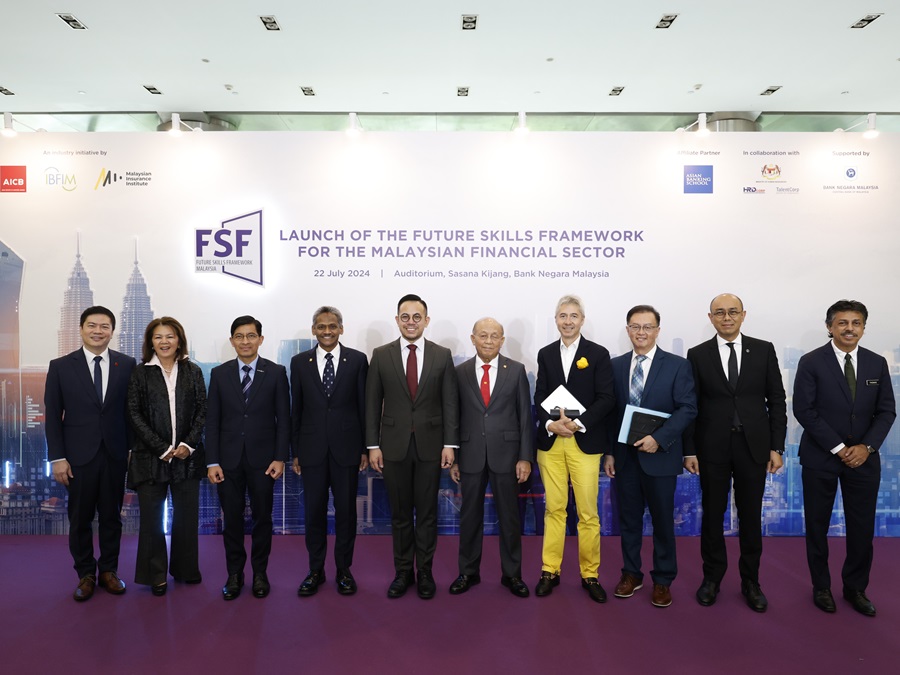According to The Future of Jobs Report 2023 by the World Economic Forum, employers estimate that by 2027, 44 per cent of workers’ core skills will be disrupted and six in 10 workers will require training, but only half have access to adequate training opportunities.
Recognising the urgency to address these challenges, the Asian Institute of Chartered Bankers (AICB), in collaboration with the Islamic Banking and Finance Institute Malaysia (IBFIM) and The Malaysian Insurance Institute (MII), today launched the first Future Skills Framework (FSF) to future-proof the Malaysian financial sector’s workforce over the next three years by promoting skills mastery and continuous learning.
Officiated by YB Tuan Steven Sim Chee Keong, Minister of Human Resources, Malaysia, and Datuk Abdul Rasheed Ghaffour, Governor of Bank Negara Malaysia (Central Bank of Malaysia), the FSF will facilitate workforce transformation, aligning with the Central Bank of Malaysia’s Financial Sector Blueprint 2022–2026, which emphasises the importance of nurturing future-fit talents to increase the financial sector’s competitiveness.

The financial sector plays a critical role in driving Malaysia’s economic growth and stability, contributing an estimated 6.7 per cent to the gross domestic product (GDP) in 2023, with growth of 4.3 per cent forecast for 2024[1].
As the financial sector in the country continues to expand, employing 168,832 workers as of the first quarter of 2024[2], the development of a future-ready workforce equipped with in-demand skills is crucial for the sector’s growth and sustainability.
The key trends impacting the Malaysian financial sector workforce, namely, GenAI, digital transformation, cybersecurity, sustainability, customer-centricity, and employee-centricity, are fundamentally reshaping business models and job roles.

The FSF identifies 159 relevant job roles and 157 skills that will be in demand for the next three years, potential career development pathways, and access to nearly 1,000 capacity-building programmes. The FSF highlights, amongst others, the growing demand for skills in frontier technologies, sustainability, and Shariah.
AICB chief executive Edward Ling said, “As Malaysia aims for a 35 per cent skilled workforce by 2030, the Future Skills Framework (FSF) marks a pivotal step in advancing a future-ready financial sector workforce. The FSF offers a transformative solution, emphasising a ‘Skills-First’ strategy that will revolutionise talent development and mobility across job roles and the financial services sub-sectors.”
Edward added that AICB is proud to lead this initiative, which reflects AICB’s commitment to addressing the industry’s evolving needs, setting high standards for skills mastery, and fostering continuous learning for the sector’s growth and professional excellence.

Yusry Yusoff, chief executive officer of IBFIM also commented, “It is our aspiration that the Future Skills Framework (FSF) will enable IBFIM to support the development of highly skilled Islamic finance professionals, equipping them with the multifaceted skillsets required for future needs.”
MII’s chief executive officer Paul Low said, “The Future Skills Framework (FSF) supports the professional development of our members in the insurance sector and aligns our global standards and best practices. MII remains committed to ensuring that the training and educational programmes we offer are relevant, well-tailored, and in alignment with the ever-changing needs of the insurance industry.”

The FSF also seeks to align educational training with the specific requirements of the financial sector, bridging the gap between employer demands and workforce skills. It identifies 15 Power (fundamental) skills, which are relevant for all job roles, complementing 142 Prime (technical) skills. Financial institutions can customise the FSF to meet their unique requirements, using it as a guide for further validation and strategic planning in enhancing talent development.
This initiative is also supported by the Human Resource Development Corporation (HRDCorp) and Talent Corporation Malaysia Berhad (TalentCorp). With effect from 22 July 2024, the public can access the FSF via the websites of AICB, IBFIM, and MII.

References:
[1] Ministry of Finance, Malaysia: Economic Outlook 2024 (October 2023)
[2] Bank Negara Malaysia: Labour Market Indicators for the Financial Services Sector (March 2024)
Source: AICB (Press Release)

